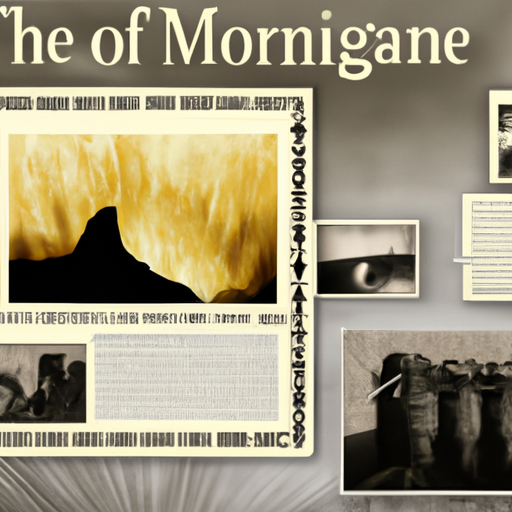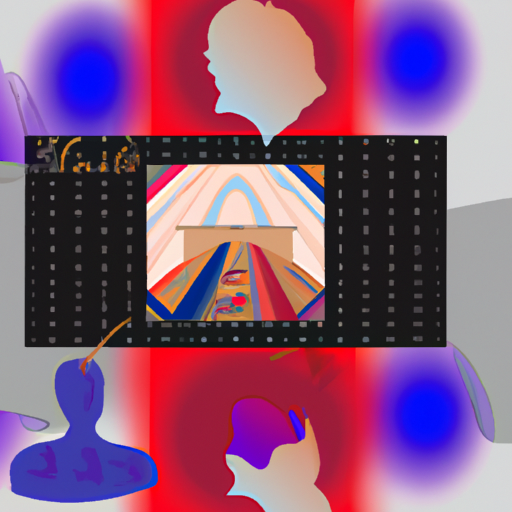A Look at History: Will Humans Ever Be Immortal?
What has been passed down through the ages, what has been seen and heard, can we ever truly comprehend it? Is there a way to break free from this seemingly infinite cycle? Have we reached the point where we can no longer be bound by our mortality? Will we ever discover a path that leads to eternal life? These are questions that have been asked for centuries, and yet remain unanswered. The search for immortality continues on, but will humans ever find a way to defy the laws of nature and achieve everlasting life? Only time will tell.

Since the beginning of time, mankind has searched for an answer to the age-old question: how can we achieve everlasting life? From forgotten tales and fables to modern-day scientific studies, each avenue has been explored in our pursuit of immortality. Yet, despite all the progress that has been made over the centuries, a definitive solution remains elusive. We remain confined by the limits of mortality, unable to escape its unending cycle. As we continue our quest for answers, one can only pray that someday we will find a way to break free from this never-ending cycle and unlock the secret to eternal life.
.
Introduction

Mystique has surrounded the concept of everlasting life for ages. From far-off times of antiquity to the current day, many have sought to unravel the puzzle of immortalization. Despite a few successes in elongating lifespans and slowing down aging, mankind is still far from attaining true immortality. In modernity, technological breakthroughs and medical progressions have enabled us to push our boundaries even further than before, but it remains unclear if humans will ever be able to put an end to mortality.
– A Historical Perspective on the Possibility of Human Immortality
The concept of human immortality has been a source of fascination and perplexity for centuries. From the Epic of Gilgamesh to modern day, people have pondered how such a feat could be achieved, and what it would mean to live forever. Throughout these years, various theories have been proposed and debated, from religious beliefs to scientific advances. In this article, we will explore the historical perspective on the possibility of human immortality by examining some of the most influential ideas about this topic over time.
In ancient times, many cultures believed that an afterlife or reincarnation was a potential path towards achieving eternal life. For instance, Ancient Egyptian religion held that after death one’s soul would be judged by Osiris and if found worthy could enter into an eternal paradise known as the Field of Reeds. The Epic of Gilgamesh explored similar themes with its story of Utnapishtim who was granted immortality by the gods after surviving a great flood.
As science began to develop during the Renaissance period, new theories were advanced which sought to explain how humans could achieve everlasting life through means other than religious faith. Notable among these is Francis Bacon’s 1627 work “New Atlantis” which suggested that scientific progress might one day lead to immortal humans living in utopia-like societies. Other thinkers such as René Descartes and Gottfried Wilhelm Leibniz also proposed theories involving mechanistic bodies or spiritual essences that could potentially never die.
Modern science continues to investigate ways in which human beings may be able to extend their lifespans or even become immortal through technological advances and medical breakthroughs such as gene therapy or cryogenics. While there is still much debate regarding whether or not true immortality is possible for humans, it is clear that this idea has long been a source of burstiness throughout history and will likely remain so for years to come.
– Exploring Ancient Beliefs About Human Immortality
Immortality has been an aspiration of humans since ancient times, with many cultures believing that life could be extended through divine intervention or magical rituals. The Egyptians, for example, had elaborate beliefs about preserving the body and soul after death to ensure immortality in the afterlife. Pharaohs took extreme measures to guarantee their own eternal life, such as mummification and building tombs. In other societies, people sought immortality by becoming gods themselves or through reincarnation – the belief that a person’s soul is reborn into another body after death.
Today, human immortality remains a desirable goal in many religions. Christianity teaches that believers will receive eternal life in Heaven upon death; Buddhists believe reincarnation can lead to enlightenment and freedom from suffering. Though our modern views on mortality may differ from those of our ancestors’, exploring these ancient beliefs provides valuable insight into our understanding of life after death.
– Examining the Impact of Religion on Ideas About Human Immortality
Throughout the ages, conceptions of life after death have been profoundly shaped by religious thought. From ancient Egypt to Christianity, spiritual beliefs have long provided a framework for understanding immortality. Concepts such as resurrection, Hades and Elysium are all rooted in religious teachings that continue to influence our ideas about what lies beyond death.
Moreover, many religions emphasize that living an ethical life is essential for achieving immortality. Hinduism and Buddhism both advocate this notion, suggesting that one’s actions in this life will determine their fate in the next.
Finally, religion has also impacted how we view death itself. For some traditions, it is seen as a natural part of life; for others, it is viewed as a punishment for sin or disobedience to God’s laws. Regardless of the interpretation, most spiritual teachings agree that there is some form of reward or consequence awaiting us after we die.
The implications of religion on our understanding of human immortality remain complex and far-reaching. It is clear that faith has had a major impact on how we think about our own mortality and what awaits us after we pass away.
– Uncovering the Role of Technology in Achieving Human Immortality
For centuries, humans have been captivated by the idea of achieving immortality. In recent years, however, technology has begun to offer potential solutions to this age-old question. From artificial intelligence and nanotechnology to genetic engineering and cloning, the potential for extending life expectancy and even achieving immortality is becoming increasingly apparent. In this article, we will explore the progress made in uncovering the role of technology in achieving human immortality.
The first attempts at using technology to extend life expectancy were made in the 19th century with cryonics – a technique that uses extremely low temperatures to preserve living tissue for future revival. Although these experiments failed due to inadequate technology at the time, they laid the groundwork for later research into extending life expectancy through technological means.
In recent decades, AI has enabled scientists to create machines capable of performing complex tasks such as diagnosing diseases and controlling robotic prosthetics. AI can also be used to monitor vital signs and detect early warning signs of illnesses or diseases before they manifest physically. This could potentially allow humans to live longer by detecting illnesses before they become life-threatening conditions.
Nanotechnology is another area where advances have been made towards achieving human immortality. By manipulating matter on an atomic scale, nanotechnology can be used to create microscopic robots that can repair cells or organs inside our bodies before they become damaged or diseased – potentially leading to an extended lifespan by preventing illness from occurring in the first place.
Finally, genetic engineering and cloning are two other areas where progress has been made towards achieving human immortality. Genetic engineering involves altering DNA sequences within genes in order to produce desired traits or characteristics while cloning involves creating exact replicas of existing organisms without any mutations occurring over time. Both techniques could potentially be used to create clones or genetically modified versions of ourselves which would then allow us to live much longer than normal lifespans permit us today.
In conclusion, there have been numerous advances made towards uncovering the role of technology in achieving human immortality over recent decades and it is clear that this field is continuing to evolve rapidly as new technologies become available. With continued exploration into AI, nanotechnology, genetic engineering and cloning, it may soon be possible for humans to reach true immutability through technological means rather than relying on traditional methods such
– Analyzing How Historical Events Have Shaped Attitudes Toward Human Immortality
Through the ages, humanity has continually grappled with mortality. From ancient cultures to modern times, events such as wars, natural disasters, and mass migrations have shaped our views on human immortality. In antiquity, death was seen as part of a cycle in which the soul would be reborn in a new form. This belief was reflected in burial practices that preserved the body and possessions for use in the afterlife.
The rise of Christianity brought with it a fear of eternal damnation that led people to strive for immortality through faithfulness to God. The industrial revolution saw a move away from religious beliefs towards more scientific explanations for death and its consequences. People began to accept mortality as an unavoidable part of life rather than something to be dreaded or evaded.
Modern medical advances have further changed our attitudes toward mortality by offering hope for extending life beyond its natural limits via technology or medicine. Many now believe that indefinite life extension is possible through science and technology, leading to an optimism about immortality that was not present before these advances were made.
It is clear that history has had an immense influence on our views about human immortality over time. Our perspectives have shifted significantly throughout the ages in response to changing social and cultural conditions – from ancient ideas about reincarnation to modern aspirations for technological solutions.
conclusion

Astonishment and astonishability have been the order of the day for centuries, as humans have sought to unlock the secrets of everlasting life. Despite all efforts, a definitive answer has yet to be found. Could it be that immortality is something that will forever remain elusive? Or could it be that we are simply on the cusp of a breakthrough? Whatever the case may be, one thing is certain: immortality remains an enigma shrouded in mystery.
.
Some questions with answers
Q1. What is the history of immortality?
A1. The concept of immortality has been around since ancient times, with various cultures and religions considering it a possibility or an ideal. In modern times, the idea of physical immortality has become more prominent due to advancements in medical technology and scientific understanding.
Q2. Has anyone ever claimed to be immortal?
A2. There have been many people throughout history who have claimed to be immortal, although these claims are usually not taken seriously. Some examples include the Chinese emperor Qin Shi Huang, who believed he could achieve immortality through elixirs; French alchemist Count Cagliostro, who claimed to possess an elixir of life; and Italian monk Giuseppe Balsamo, who also claimed to have an elixir that would make him immortal.
Q3. Are there any scientific theories on how humans could become immortal?
A3. Scientists have proposed a few possible ways in which humans could potentially achieve immortality, such as cryonics (freezing bodies until they can be revived), genetic engineering (altering DNA to extend lifespan), and nanotechnology (using tiny robots to repair cells). However, none of these methods have been proven to work yet.
Q4. Is immortality a desirable goal?
A4. Opinions on this vary greatly depending on individual beliefs and values. Some people believe that physical immortality would lead to boredom or stagnation over time, while others believe it could bring about great advancements in science and technology.
Q5. Are there any historical accounts of people achieving immortality?
A5. There are no reliable historical accounts of anyone actually achieving physical immortality, although some people throughout history have claimed to do so or sought ways to achieve it through elixirs or other means.





